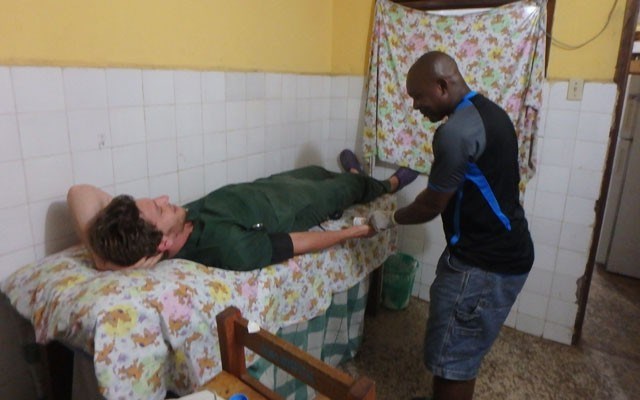At just 23 years old, Squamish nursing student Ian MacKay has volunteered in some of the most troubled areas of the world, each of them leaving an indelible mark on his psyche. But none of those experiences — not an earthquake-ravished Haiti in 2008 or a war-torn Eastern Congo last year — would compare to the harrowing time he spent working in an Ebola clinic in Liberia this summer.
"I always come back a bit of a different person from these experiences. I know this was definitely the hardest trip I've ever been on," MacKay said, now back in B.C. "The exposure to death was just unreal. You know when these people walked into that Ebola centre thinking they're positive with the virus that there was a good chance they weren't going to be walking out on two feet, but leaving in a body bag."
MacKay was in the West African nation that has been so devastated by unprecedented outbreaks of the hemorrhagic virus with a Christian aid group called Samaritan's Purse. He and a group of six other expats would be thrust into international headlines after two of MacKay's colleagues — Dr. Kent Brantly and Nancy Writebol — contracted the virus.
"As an aid worker, you go in thinking you're somewhat superior to the virus because you're there to help others, and you come from North America. Then Kent and Nancy went positive and it was an eye-opening moment sitting in that room that moment and hearing the news," MacKay remembered. "And you know, I cracked. I hit my limit and I had never done that before. Maybe in Haiti after the earthquake when I was 19, but I'd never been that exhausted and that drained and that scared in my life. It was terrifying not knowing what was going to happen next and, at that point, not being able to get Kent and Nancy out right away."
It was the first significant exposure the outbreak received in the major press, and MacKay made the onerous decision to give up his seat on a flight home to stay an extra week in order to help his coworkers evacuate the country.
"I made the decision to stay and it was a very tough decision. I know it was tough for my family as well," MacKay explained.
"When I first hit the wall and cracked, I wanted to get out of there right away, hop on a plane and come home to be as close to a good healthcare system as I possibly could. But at that point, I knew I couldn't live with myself if something happened to Kent and Nancy that I could've helped prevent."
Brantly and Writebol would eventually be evacuated and ultimately cleared of the virus, but, for the thousands of patients and medical staff still struggling with Ebola throughout Western Africa, there appears to be no end in sight.
And that's why MacKay wants to go back.
"I felt like I abandoned the people there and the job wasn't done when I left," he said. "I felt that the hardest part of this trip was abandoning them, and that's why I need to go back. I don't think I'll be at peace with this whole situation until I'm able to go back and see the virus contained and see that the international community has stepped up and done the proper humanistic thing."
That means having workers on the ground, and U.S. President Barack Obama's recent pledge to send 3,000 troops to help manage the crisis is an important first step, MacKay said, but still, much more needs to be done.
"Of course they need money, but they need volunteers and they need expertise," he said. "There has only been around 34 outbreaks in the history of the virus, so there's been very little research that's gone into it, which poses a lot of unknowns.
"I think it's a matter of coming together as a global community to combat this virus. One country can't do it on its own."
Since returning to Canada over a month ago, MacKay said he's struggled with reintegrating back into day-to-day life, and admits that his homecoming felt markedly differently this time around.
"Coming home from these trips, you're usually greeted with a hug, but on this one no one really knows whether or not it's safe to hug you, or touch you or come close to you," he said. "A lot of my family was scared to come see me, so that was tough because you come home in this emotional state, not exactly wanting, but needing support, and I found a lot of it just wasn't there in the ways it has been in the past."
MacKay attributes being able to deal with the unspeakable horrors he has witnessed in Liberia and elsewhere in part to growing up in the mountain town of Squamish.
"As a small-town Squamish boy, I knew I could go into these areas and live off little to none, because that's sort of what you're raised with in Squamish, being able to do that, being raised in the mountains and knowing I can live in a tent without a roof over my head," he said.
"A lot of people aren't compelled to go in these dangerous environments, but it's just who I am."




